Sun coverage
The U.S. Supreme Court is tackling two major cases this week that, depending on the outcome, may set the course for marriage equality laws across the country.
On Tuesday, the court heard arguments about the constitutionality of Proposition 8, the California ballot measure banning gay marriage that the 9th Circuit Court of Appeals ruled unconstitutional about a year ago. On Wednesday, they’re tackling the constitutionality of the federal law that defines marriage as exclusively between a man and a woman and absolves states of responsibility to recognize the validity of gay marriages performed in other states.
The cases won’t finally settle the question of whether gays should be allowed to marry in all 50 states. But the Supreme Court’s decisions — due before late June — will set a standard for where the country stands on the underlying issue of homosexual marriages that could easily inspire a shake-up in laws nationwide.
In a way, that trend has started. In the past week, several heretofore silent lawmakers from across the political spectrum have declared support for gay marriage as well as a new distaste for the Defense of Marriage Act that established the heterosexual-only definition in 1996.
In Nevada, such a trend could have a palpable effect, as the state Legislature is considering a change to the Silver State’s definition of marriage that would allow gay couples to marry. Senate Joint Resolution 13 would repeal Nevada’s heterosexual-only definition of marriage. If the Legislature passes it this year and in 2015, it will go to voters in 2016.
But despite the confluence of potentially precedent-setting moments in Nevada, just a few of the state’s top elected officials have noticeably changed their position on gay marriage in the past several months.
-
Senate Majority Leader Harry Reid, Democrat
Last year, Reid had one of the most public evolutions on gay marriage in the Democratic Party, overshadowed only by President Barack Obama’s public declaration that homosexual couples should be afforded the same marriage rights as their heterosexual counterparts.
“My personal belief is that marriage is between a man and a woman,” Reid said at the time. “But in a civil society, I believe that people should be able to marry whomever they want, and it’s no business of mine if two men or two women want to get married.”
Before last spring, Reid would publicly defer to the Church of Jesus Christ of Latter-day Saints’ position opposing gay marriage when asked about his stance on the legality of such unions (the Mormon church was one of the largest financial backers of the Proposition 8 ballot question in California).
This year, however, Reid went so far as to sign a friend-of-the-court brief expressing his belief that the Defense of Marriage Act’s definition of marriage should be ruled unconstitutional.
“When Congress enacted DOMA, gay and lesbian couples could not marry anywhere in the world. ... In short, it was a different world for gay men and lesbians,” the brief Reid signed read. “DOMA must be struck down.”
Reid indicated last year that the Senate could vote on whether to repeal the Defense of Marriage Act, but that was before the Supreme Court announced it would weigh the constitutionality of the 1996 decision in Windsor v. United States.
-
Sen. Dean Heller, Republican
Heller has made a move toward the center on many social issues dominating the political discussion. But on gay marriage, he remains quietly, but firmly, of the opinion that marriage is a heterosexual-only institution.
“Sen. Heller supports traditional marriage and believes this is an issue that should be decided on a state level,” Heller’s spokeswoman, Chandler Smith, said this week.
Heller’s voting record on various gay rights issues reflects that stance. He voted against the repeal of the military’s Don’t Ask, Don’t Tell policy in 2010, a vote for which many Republicans — including then-Nevada Sen. John Ensign — crossed party lines to vote to end the policy that kept gay servicemen and women from being open about their sexual orientation. Like many in his party, Heller cast earlier votes against hate crime and employee nondiscrimination protections for homosexuals.
Still, it is worth noting that recently, Heller has not indicated any interest in going to the mat over issues pertaining to gay marriage. He recently described a push to extend immigration benefits to same-sex couples “interesting” — which is not exactly a ringing endorsement but is neither an outright condemnation. Heller has not publicly expressed an opinion on SJR13.
-
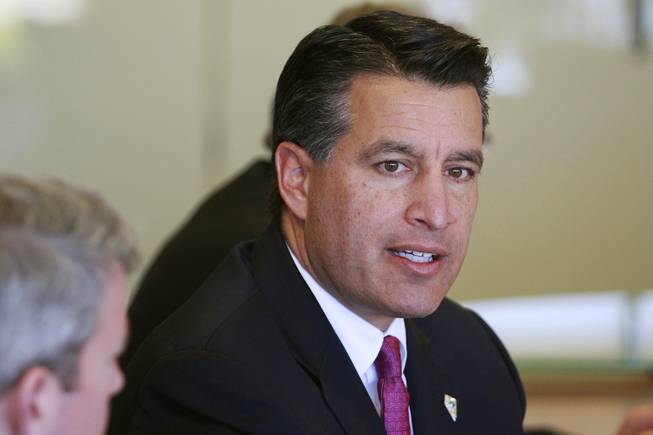
Nevada Gov. Brian Sandoval, Republican
As Nevada’s top Republican, the head of a state often split on social issues and the named target of a previous lawsuit challenging Nevada’s current civil unions-only law, Sandoval occupies a uniquely central position in the gay marriage debate.
For now, he is balancing that position by toeing the party line but refusing to tip the scales of public opinion further by advocating for one outcome or another in either Supreme Court case or the eventual result of a Nevada referendum.
“My personal belief is that marriage is between a man and a woman,” Sandoval said in a statement supplied to the Sun on Tuesday. “But as governor, I believe the people of Nevada should have the freedom to decide should this issue come before them for a vote.”
-
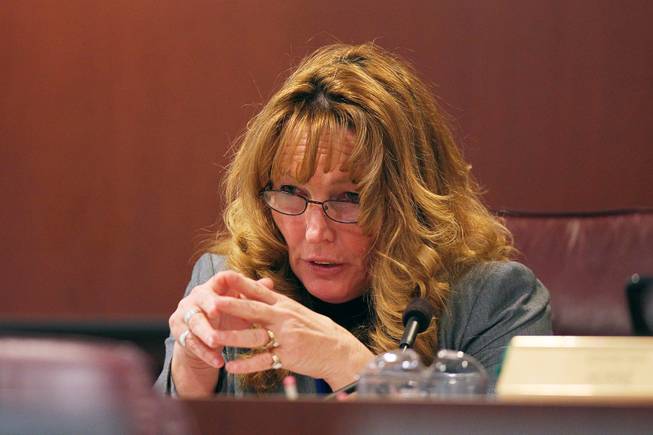
Nevada Assembly Speaker Marilyn Kirkpatrick, Democrat
The Legislature’s top elected Democrat will bear the primary responsibility for carrying the pending Senate resolution through the Assembly, should it continue to gain traction as the debate over gay marriage continues at the state and federal levels.
Kirkpatrick said public opinion has affirmed the legitimacy of gay marriage is waiting for legislatures and other institutions to catch up.
“Public opinion has shifted in the last 10 years on this issue,” she told the Sun in a statement this week. “It’s not the role of the government to potentially stand in the way of the will of the people.”
Kirkpatrick also said she thinks Nevadans should get the chance to vote on the question of extending marriage rights to homosexual couples.
-
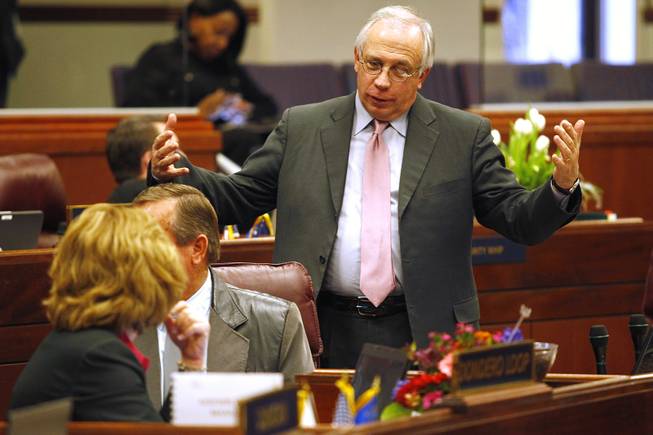
Nevada Assembly Minority Leader Pat Hickey, Republican
Although some Republicans have supported the idea of a state referendum on gay marriage, others think the matter has been settled in the court of public opinion — on the side of restricting marriage as a heterosexual-only institution.
“Nevadans have already spoken clearly on the side of preserving the traditional institution of marriage between a man and a woman,” Hickey said in an email.
In 2002, by a two-thirds majority, Nevada approved a ballot question banning gay marriage. Seven years later, the Nevada Legislature approved civil unions, though not marriages, for homosexual couples.
Still, Hickey considers the matter settled and rejects the idea that it is time to reopen an issue he says was publicly adjudicated.
“Liberals love diversity,” Hickey said. “Let there then be a diversity of opinions in the states. History has shown two-parent marriages are society’s least restrictive means of ensuring the well-being of children.”
-
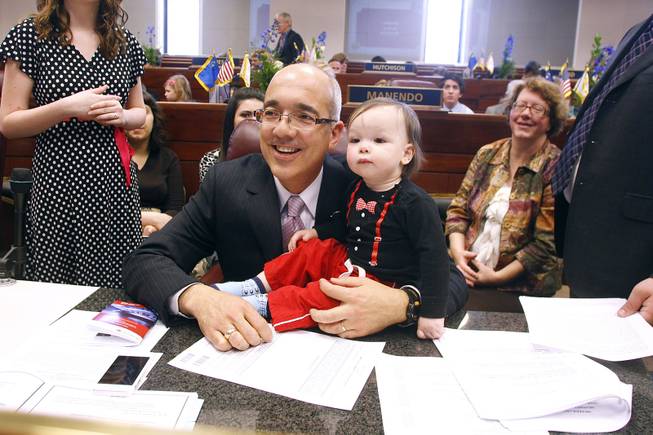
Nevada Senate Majority Leader Mo Denis, Democrat
Reid isn’t the only leading Mormon Democrat who has personally wrestled with the gay marriage issue as his party coalesces around a fully supportive stance. In the Nevada Senate, Denis has also been weighing the teachings of his church with the position of his party.
Though Denis has not gone quite as far as Reid, he has made an effort to remove his own personal opinions from the equation.
“Sen. Denis’ stance on marriage equality is that ultimately it is up to the voters of Nevada,” said Denis’ spokesman, Mike Luce, noting that Denis has supported the effort to give voters a say on removing the heterosexual-only definition from the state constitution by public referendum. “He will stand behind whatever choice the voters of Nevada make.”
-
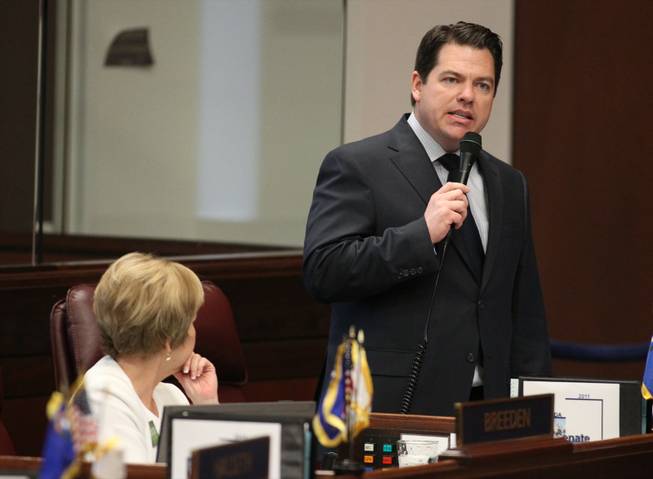
Nevada Senate Minority Leader Michael Roberson, Republican
Democrats aren’t the only ones publicly threading the needle between their personal opinions and their official votes on gay marriage.
Case in point: Roberson, who maintains that marriage is a heterosexual-only institution, said this week he would support a measure to remove that definition from the state constitution and efforts to do the same at other levels of government.
“I have always believed that marriage is a religious union between a man and a woman, and I have never understood why government has a role in this relationship,” Roberson said. “However, given the fact that the government does license and sanction marriage in Nevada, it is difficult for me to justify differential treatment based upon sexual orientation.”
“I cannot support treating one group of individuals differently under the law than another. As such, I support giving the voters the option of repealing this provision of our state constitution.”
-
1st Congressional District Rep. Dina Titus, Democrat
When Titus was serving in the Nevada Senate, she openly challenged efforts to promote a definition of marriage that excluded same-sex couples.
As a U.S. congresswoman, she supports gay marriage and all efforts to overturn the federal laws that have kept homosexual couples from being able to marry and have those marriages recognized in all corners of the U.S.
“We must fight against discrimination and unequal treatment under the law at all levels of government and extend same-sex couples the legal protections and rights that federal law provides to all other married couples,” she said in a statement, reiterating her readiness to vote to repeal the Defense of Marriage Act if presented with the opportunity in Congress.
-
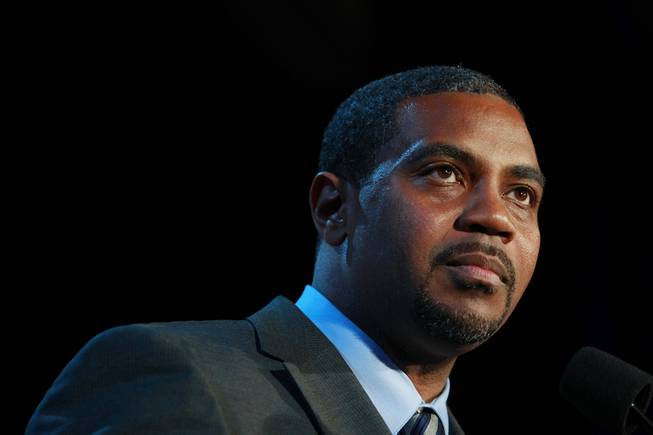
4th Congressional District Rep. Steven Horsford, Democrat
As state Senate majority leader, Horsford was a vocal supporter of gay marriage who also recognized the challenges of fully revamping marriage laws in Nevada.
Though he personally would have gone further, Horsford championed and congratulated lawmakers for their “courage” in 2009 when state lawmakers voted to legalize civil unions, though they stopped short of affording gay couples full marriage rights.
In Congress, however, Horsford thinks it is past time for such compromises. He has fashioned himself as a vocal advocate for equal marriage rights and supports the extensive federal changes necessary to give gay couples access to marriage that is on equal legal footing with homosexual couples.
“I am a strong supporter for LGBT rights and the freedom to marry,” Horsford said in a statement. “Discrimination of any kind of wrong and should be fought at every turn. ... It is time to stop denying federal benefits to those in committed relationships and end discrimination based on who you love.”
-
3rd Congressional District Rep. Joe Heck, Republican
As the gay marriage debate picks up speed, many lawmakers have felt the need to clarify their personal views.
Other lawmakers, such as Heck, think it is safest to express no personal position.
“Congressman Heck believes that the definition of marriage should be determined by the states,” Heck’s spokesman, Greg Lemon, said this week.
Heck enjoys the unique position of a having a voting record that is sparser than most when it comes to gay rights. He had left the state Senate when civil unions were approved in 2009 and wasn’t yet in Congress when it voted to repeal Don’t Ask, Don’t Tell in 2010.
Heck hasn’t reacted particularly warmly to lawmakers’ expressions of personal evolutions on gay marriage either. Last year, he called Obama’s announcement of support for gay marriage a distraction from the real issues, according to several reports.
-
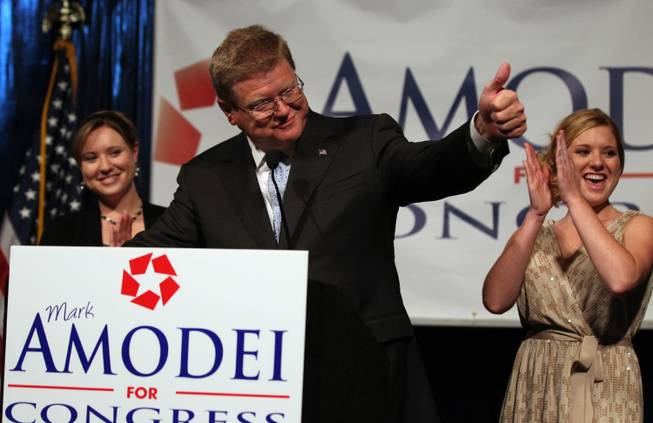
2nd Congressional District Rep. Mark Amodei, Republican
Heck isn’t the only Nevada congressman who has tried to stay relatively mum on gay marriage: For the past few years, Amodei hasn’t volunteered much public comment on the subject.
Unlike Heck, however, Amodei has a recent voting record on the subject: In 2009, he voted against the bill that made civil unions legal in Nevada. Amodei has not made a concerted public effort to change the record about his stance.
A spokesman for Amodei did not respond to inquiries about Amodei’s stance on gay marriage, and the issue did not emerge as a point of contention in either his 2011 bid to Congress or his 2012 re-election race.

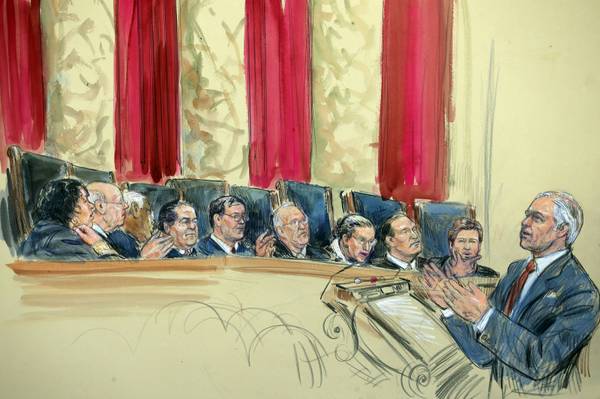
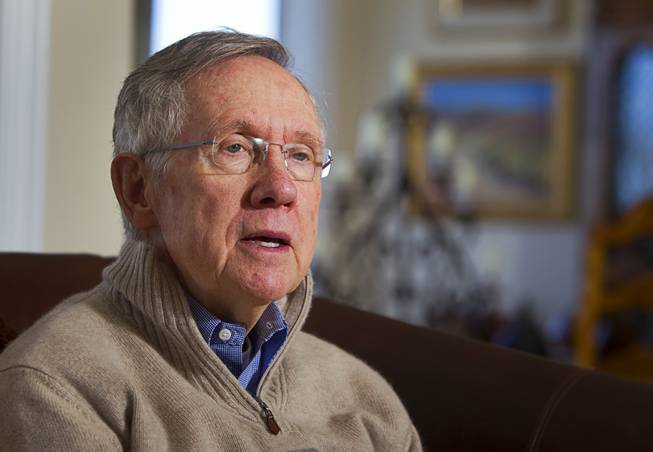
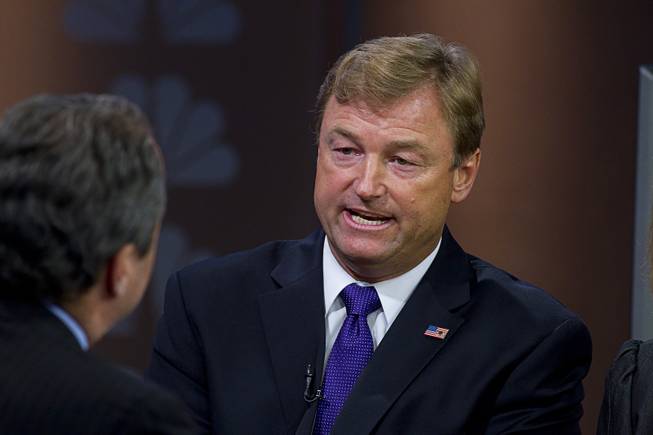





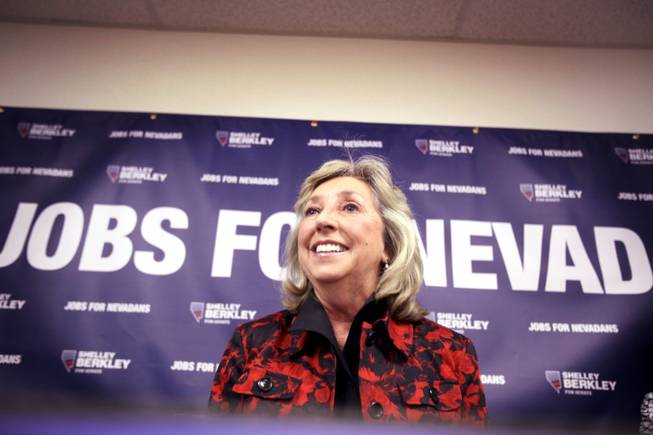

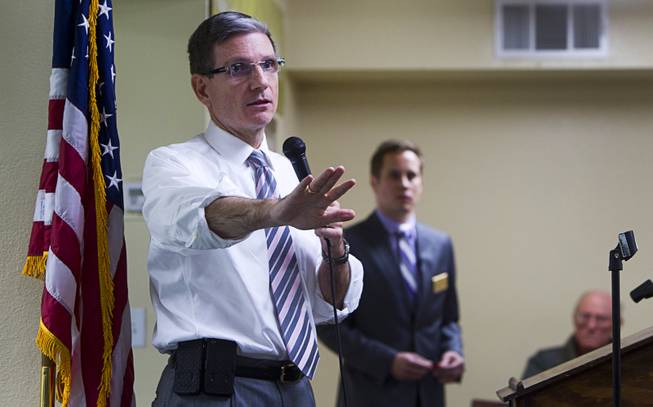

Join the Discussion:
Check this out for a full explanation of our conversion to the LiveFyre commenting system and instructions on how to sign up for an account.
Full comments policy